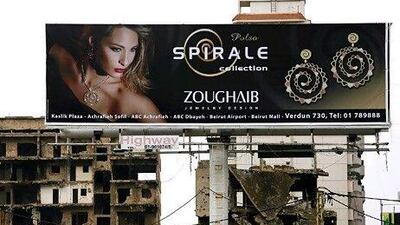Lebanon's economy has been badly affected by unrest in Syria and a decline in big-spending tourists from the Arabian Gulf.
Nationals of countries including the UAE and Saudi Arabia have been told not to travel to Beirut due to security concerns, leading to a tough summer for the country's hotel and restaurant businesses.
"The number of visitors from Gulf states has declined drastically to a trickle," said Sami Raffoul, the founder and general manager of the Pan Arab Research Centre (Parc).
In addition, up to 30,000 Syrian refugees may have crossed into Lebanon at the end of last week, according to the United Nations refugee agency.
The situation in Syria has had a knock-on effect on key industries such as tourism, advertising and entertainment in Lebanon, said Mr Raffoul.
About 40 per cent of the tourists to Lebanon are nationals from Arab countries and Mr Raffoul said the numbers were much lower this year than usual.
"Normally, you'd find a lot of number plates from Kuwait, Saudi Arabia and the UAE. This year, you probably find one in a thousand," he said.
However, there was a slight increase in hotel occupancy in Beirut during the first five months of the year, according to a survey conducted by Ernst & Young. The occupancy rate reached 66 per cent in Beirut, up from 52 per cent last year but that was before the traditionally busy summer period, which commentators say is quieter than usual this year.
Hotels outside Lebanon's capital are operating at near zero-occupancy levels, according to Lebanese press reports.
Gloomy sentiment among local businesses is forecast to spur an "acute" decline in Lebanon's advertising market, said Mr Raffoul.
"We expect the whole period of the summer to be seriously affected. Hotel occupancy is on the lower side of the scale.
"Restaurants and food outlets are ... empty spaces," he said.
Antonio Vincenti, the chief executive of Pikasso, one of Lebanon's biggest outdoor advertising firms, said billings were down heavily this year.
"There is a fall in outdoor advertising. We are less 11 per cent this year," said Mr Vincenti.
"We have had fewer tourists this summer. [With] the problems in Syria ... all that means you have a very delicate situation in Lebanon."
The total advertising market in Lebanon, which is worth an estimated US$100 million (Dh367.3m) a year, has also been hit by the regional unrest.
"Due to the turmoil in the area, it has been a very tough year. Clients are making their decisions at the last minute - they have no planning or advance booking," said Mr Vincenti.
But he said he was confident the decline in revenues for the advertising industry would "temporary".
"As soon as things settle down in the area, there will be again a take off," he said.
Hana Khatib, the managing director for Lebanon and Jordan at the media agency Mindshare, estimated there had been a 15 per cent drop in spending on billboard advertising.
The overall advertising market in Lebanon is down by 5 to 10 per cent, she said.
"The situation in Syria is affecting local businesses."
bflanagan@thenational.ae

Lebanon hit as unrest in Syria puts off tourists
Regional unrest has hit key industries like tourism, advertising and entertainment in Lebanon
Most popular today
